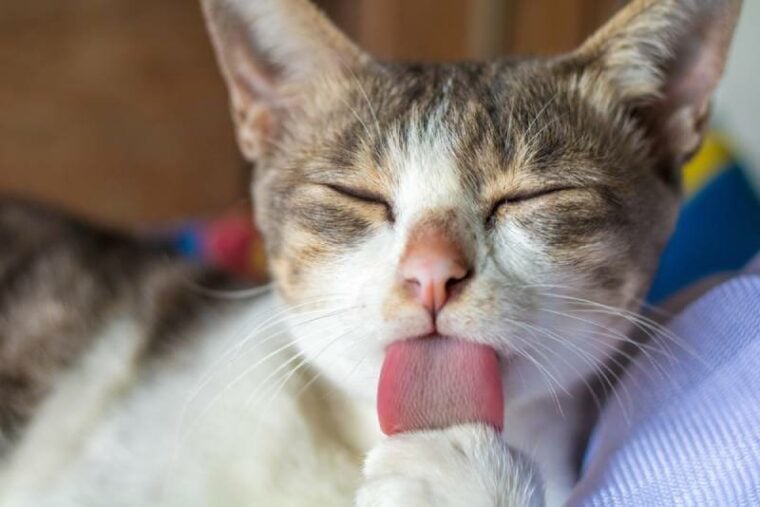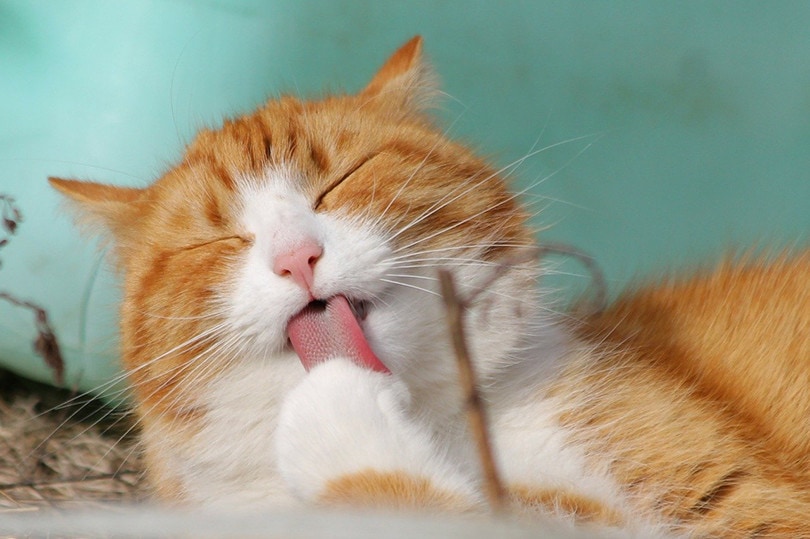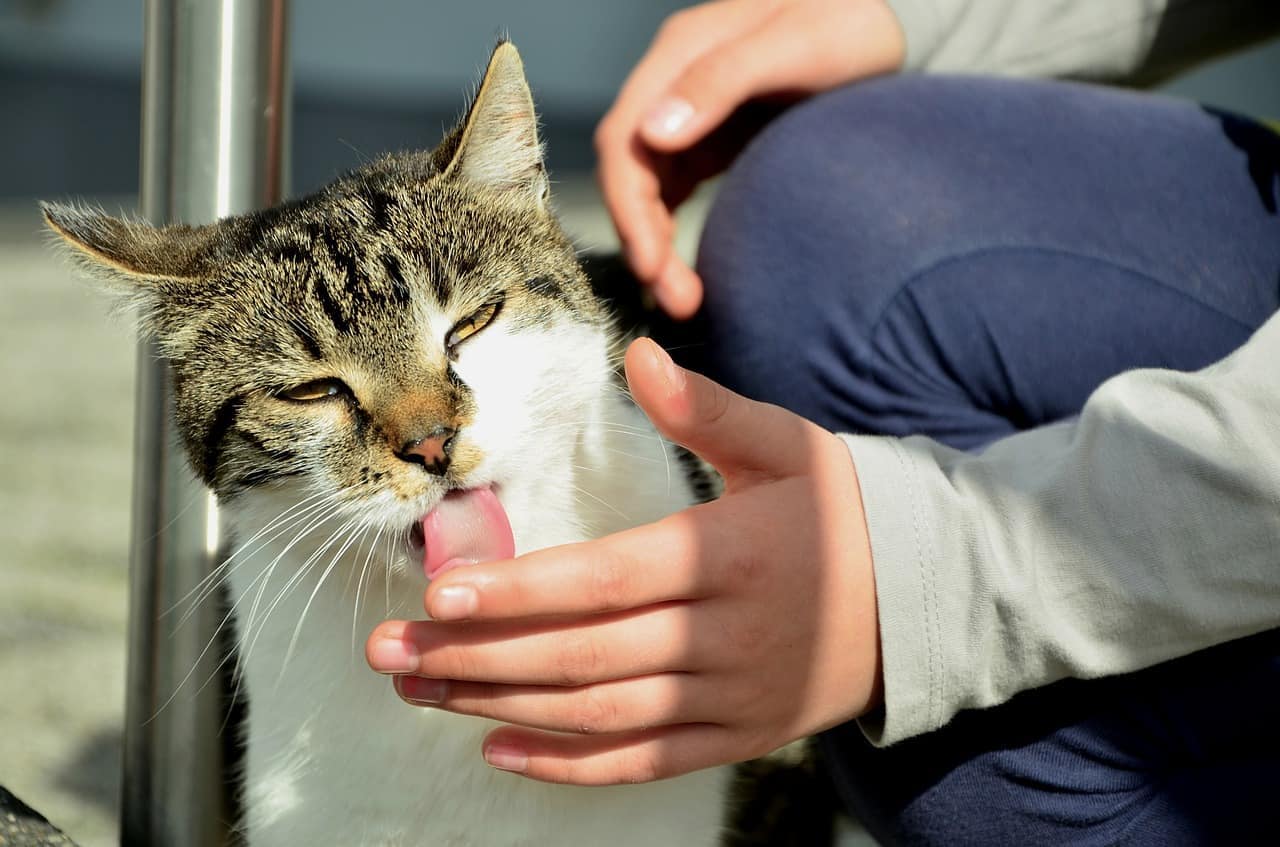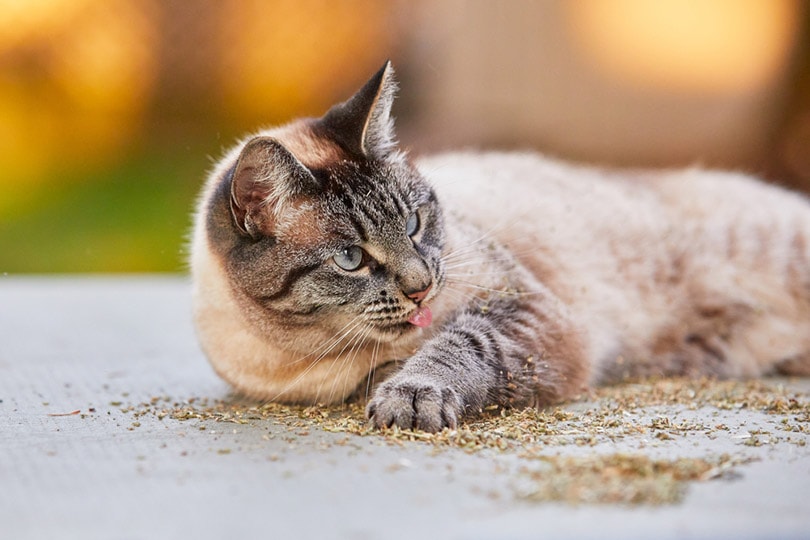
Our cats communicate all kinds of things to us on a daily basis. The reasons behind certain behaviors can sometimes be hard to pinpoint, given that we don’t speak the same language.
If you’ve felt like a bathtub for your cat, there are a few reasons that your feline may be cleaning themselves on your lap—and they are all positive! Let’s jump right in.
 The 4 Possible Reasons Why a Cat Cleans Herself on You
The 4 Possible Reasons Why a Cat Cleans Herself on You
1. Vulnerability
Your cat is a predator, it’s true. However, they have very keen senses as to what is going on around them, staying on high alert. When they engage in grooming, they need to be completely relaxed.
In order to relax, they have to have complete certainty that their current environment is safe and free of any threat or potential danger. Even if there is a little chaos happening around you, grooming can’t take place while your cat is in a state of reservation.
So, if you notice your cat lapping their fur while cuddling, this is a surefire signal that they totally trust you.

2. Affection
A cat licking themselves on your lap can also be a huge part of their love language. You might also notice they take pauses during their grooming session for rubs, welcomed with purring and bunting.
In addition to all the sweet behaviors your cat shows while grooming, they might also have their purr box running with the volume up. As any cat owner knows, purring is a direct sign of pleasure, comfort, and love.
Did you know that a cat purrs in a consistent pattern between 25 and 150 hertz? Scientists have discovered that a cat’s purr at this frequency can promote healthy bone density and improve other areas of overall health.
Is it really any wonder that Egyptians revered cats as gods? If their purr holds magical healing powers, we really can’t blame them.
So, consider yourself one lucky person if your cat is sharing this healing affection with you—licks and all.
3. Comfortability
You might simply make your cat feel plumb comfortable. They love cozying up with their favorite human, enjoying all of their favorite activities—cuddles, cleanliness, and massages.
You might also see other behaviors in addition to grooming that can signal comfort. For instance, if your kitty is kneading in between licks, it can be a display of immense love and admiration.
You can pretty much instantly tell that they are thoroughly enjoying the experience—and you probably are, too.

4. Trust
You know as well as any feline lover that our cats can be a little finicky about their boundaries. They don’t always trust humans, and definitely have limits depending on who you are.
But if your cat is grooming themselves on your lap, this is a big show of trust for their human. After all, you don’t see your cats grooming themselves on just anyone’s lap.
When an animal trusts you, body language changes. They become relaxed, dismissive of their surroundings, and fully submerged in the moment.
Knowing your little one is so sure they can rely on you must make you feel like a million bucks.
When Is Grooming a Problem?
Your cat grooming themselves on your lap is often a wonderful sign that your guy or gal is totally at peace and enjoying life. But, as body language tells us, that isn’t always the case.
Excessive grooming can indicate that there is an underlying problem that could potentially need addressing. You know your cat better than anyone so you can definitely tell the difference between a relaxed bathing session and a frantic one.

Here’s when grooming can be problematic.
Conclusion
So, now you know that grooming on your lap typically represents good things—comfort, relaxation, trust, companionship—the works! In simple terms, it means your cat loves you and knows that they can count on you.
However, if it seems like a negative or sudden change, look for underlying triggers. If you can’t seem to find a solution, it might be time to schedule an appointment to get to the bottom of it.
Featured Image Credit: Sathaphorn Suriyon, Shutterstock


 The 4 Possible Reasons Why a Cat Cleans Herself on You
The 4 Possible Reasons Why a Cat Cleans Herself on You




